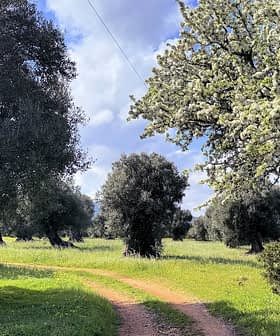Difficult Harvest in Italy Leads to Higher Prices
Italian olive oil production in 2016 will probably be half of last year's, yet producers acted in time to maintain high-quality as global prices trend upward.
“Mills opened ahead of time all over Italy,” said a market analyst at the Institute of services for the agricultural and food market ISMEA, Tiziana Sarnari. “It is now established practice to pick olives early, during their veraison stage to preserve all the organoleptic and sensorial qualities of olive oils. Nevertheless, this happens also for more practical purposes, namely to get most of the production (early) during a difficult harvest like the one we are going through.”
They coped with difficulties and, despite the decline in production, reached high levels of quality.
According to the last report by ISMEA, in collaboration with the national organization of olive oil producers, Unaprol, the Italian production of olive oil in 2016 will probably amount to 243,000 tons, with a 49 percent drop.
See Also:Complete Coverage of the 2016 Olive Harvest
While southern and central regions have suffered a decrease of 50 and 40 percent respectively, more favorable climatic conditions allowed the northern sector to achieve slightly better results. This is probably due to the smaller size of productive areas which allowed closer monitoring, but it is interesting to note that in places olive growing has been recently introduced, olive trees in full production expressed their maximum potential.
The early harvest was mainly urged on by the fear of yet another attack of the olive fruit fly Bactrocera oleae that could still damage the olives that had resisted previous attacks. In addition to the lower yields due to biological alternation, adverse weather conditions interchanged heat and cold in rapid succession, rains and, subsequently, a wet summer with temperatures that did not exceed 30°C (86°F) at night. This created the ideal environment for a tremendous development of olive fly, that in 2014 already undermined Italian production.
Traditionally, these kinds of annus horribilis from the phytosanitary point of view are distanced up to 15 years. “Nevertheless, what happened two years ago alerted many manufacturers, which acted properly and saved part of the production,” Sarnari considered. “More healthy olives have been selected, and the quality is higher than it was in 2014.”
This was echoed by the president of the Mediterranean Union of Oil Tasters, UMAO. “Nature provided some warnings, which allowed producers to better meet the challenge,” Paola Fioravanti said. “Monitoring and applying proper treatments at the right time, they coped with difficulties and, despite the decline in production, reached high levels of quality.”
In accordance with to the latest data provided by the International Olive Council, a 14 percent drop is expected in the worldwide production, which will stand well below the 3‑million-ton threshold, with a drop of 6 percent in Spain, 19 percent in Greece, 14 percent in Portugal, 29 percent in Tunisia, 15 percent in Morocco, 18 percent in Argentina.
Despite the initial expectations, upward trends of prices in Italy breached the limit of €5.50 per kilogram in November. In accordance with the IOC, a slight price increase is globally recorded (10 percent in Spain, 21 percent in Greece, 12 percent in Tunisia).








